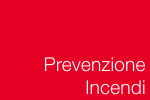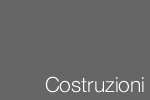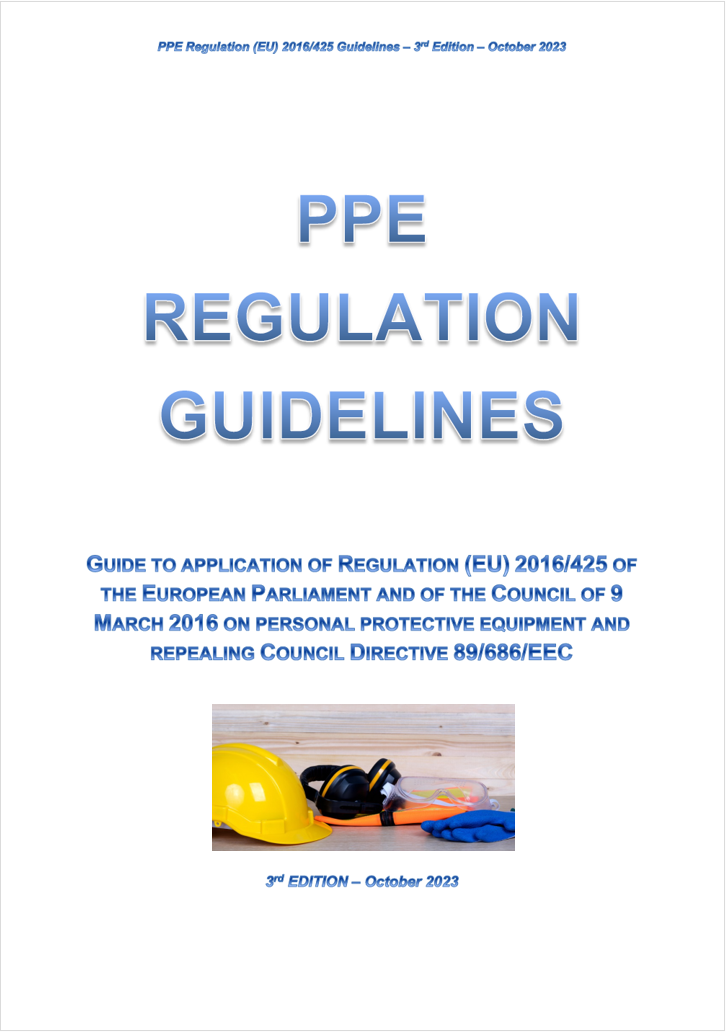Linee guida DPI Regolamento (UE) 2016/425 | Ed. 3.0 Ottobre 2023
ID 20798 | 3nd Edition - October 2023
PPE Regulation Guidelines - Guide to application of Regulation EU 2016/425 on personal protective equipment
The objective of these PPE Guidelines is to clarify certain matters and procedures referred to in Regulation (EU) 2016/425 on personal protective equipment. They provide a cross reference from the legal text of the Regulation to explanations by EU sectorial experts. The Guidelines should be used in conjunction with the Regulation itself and with the European Commission’s “The ‘Blue Guide’ on the implementation of EU product rules”.
These Guidelines are not only for the use of Member States’ competent authorities, but also by the main economic operators concerned, such as manufacturers, their trade associations, bodies in charge of the preparation of standards as well as those entrusted with the conformity assessment procedures.
The updates concern the topics and the sections indicated below:
- exoskeletons, section 2.3
- module B+ C2 p lacing on the market, sections 5.2. and 16
- conformity assessment of multi risk PPE, section 11.21
- harmful effects of noise, section 11.29
- review of the EU type examination certificate, section 14
- blue light, points 2.1 and 2.10 of the categorization guide
- laser radiation, point s 2.2, 4.2, 5.2, 6.3, 8.3 and 9.3 of the categorization guide
- welder’s clothing and gloves, points 5.2, 5.4, 6.2, 6.3, 9.2 and 9.3 of the categorization guide
First and foremost, this document must ensure that, when correctly applied, the Regulation leads to the removal of obstacles and difficulties related to the free circulation (free movement) of goods within the European Union (EU) and the European Economic Area (EEA). It should be noted that the statements in these Guidelines refer only to the application of Regulation (EU) 2016/425 unless otherwise indicated. All parties concerned should be aware of other requirements, which may also apply.
The PPE Regulation (EU) 2016/425 is total harmonisation and a “New Approach” legislation aligned to the “New Legislative Framework”. It lays down essential health and safety requirements (EHSRs) and leaves it to standards, primarily European harmonised standards, to give technical expression of the relevant requirements contained in the Regulation.
The reader has to be aware that when PPE is intended for use in a workplace, national and Union legislation, intended to ensure the safety of employees, will usually apply. Whereas “New Approach / “New Legislative Framework” legislation set the highest possible requirements given their overall objectives and hence do not allow for additional national provisions within scope, “use” Directives (89/391/EEC4, 89/656/EEC) set minimum requirements. In effect this means that national authorities, following the agreement of other Member States by means of the notification procedure under Directive (EU) 2015/1535, can put in place further requirements relating to “use” and selection so long as these do not constitute a barrier to trade.
____________
1. PREAMBLE TO THE PPE REGULATION - THE CITATIONS AND THE RECITALS
1.1. The citations
1.2. The legal basis of the PPE Regulation
1.3. The recitals
1.4. The previous PPE Directive
1.5. The “New Legislative Framework”
1.6. The scope and the objective of the PPE Regulation
1.7. Exclusions from the scope
1.8. Responsibilities of economic operators
1.9. Responsibilities of manufacturers: conformity assessment
1.10. Responsibilities of importers and distributors
1.11. Documentation to be provided by economic operators
1.12. Obligations of the manufacturer for economic operators
1.13. Information and traceability of PPE for market surveillance
1.14. Noise, vibrations and radiation
1.15. Use of PPE at the workplace
1.16. The EU declaration of conformity
1.17. Technical documentation
1.18. The EU type-examination certificate
1.19. The CE marking
1.20. Conformity assessment procedures
1.21. Conformity assessment bodies: notified bodies
1.22. Compliance of products on the market and market surveillance
1.23. The safeguard clause procedure
1.24. Delegated and implementing powers and procedures
1.25. The PPE Committee
1.26. Implementing acts concerning measures on non-compliant products
1.27. Transitional provisions
1.28. Enforcement: penalties
1.29. Subsidiarity and proportionality
1.30. Repeal of Directive 89/686/EEC
2. CHAPTER I - GENERAL PROVISIONS
2.1. Article 1 - Subject matter
2.2. Article 2 - Scope
2.3. Article 3 - Definitions
2.4. Article 4 - Making available on the market
2.5. Article 5 - Essential health and safety requirements
2.6. Article 6 - Provisions concerning the use of PPE
2.7. Article 7 - Free movement
3. CHAPTER II - OBLIGATIONS OF ECONOMIC OPERATORS
3.1. Article 8 - Obligations of the manufacturers
3.2. Article 9 - Authorised representatives
3.3. Article 10 - Obligations of importers
3.4. Article 11 - Obligations of distributors
3.5. Article 12 - Cases in which obligations of manufacturers apply to importers and distributors
3.6. Article 13 - Identification of economic operators
4. CHAPTER III - CONFORMITY OF THE PPE
4.1. Article 14 - Presumption of conformity of PPE
4.2. Article 15 - EU declaration of conformity
4.3. Article 16 - General principles of the CE marking
4.4. Article 17 - Rules and conditions for affixing the CE marking
5. CHAPTER IV - CONFORMITY ASSESSMENT
5.1. Article 18 - Risk categories of PPE
5.2. Article 19 - Conformity assessment procedures
6. CHAPTER V - NOTIFICATION OF CONFORMITY ASSESSMENT BODIES
6.1. Article 20 - Notification
6.2. Article 21 - Notifying authorities
6.3. Article 22 - Requirements relating to notifying authorities
6.4. Article 23 - Information obligation on notifying authorities
6.5. Article 24 - Requirements relating to notified bodies
6.6. Article 25 - Presumption of conformity of notified bodies
6.7. Article 26 - Subsidiaries of and subcontracting by notified bodies
6.8. Articles 27 and 28- Application and procedures for notification
6.9. Article 29 - Identification numbers and lists of notified bodies
6.10. Article 30 - Changes to notifications
6.11. Article 31 - Challenge of the competence of notified bodies
6.12. Article 32 - Operational obligations of notified bodies.
6.13. Article 33 - Appeal against decisions of notified bodies
6.14. Article 34 - Information obligation on notified bodies
6.15. Article 35 - Exchange of experience
6.16. Article 36 - Coordination of notified bodies
7. CHAPTER VI - UNION MARKET SURVEILLANCE, CONTROL OF PPE ENTERING THE UNION MARKET AND UNION SAFEGUARD PROCEDURE
7.1. Article 37 - Union market surveillance and control of PPE entering the Union market
7.2. Article 38 - Procedure at national level for dealing with PPE presenting a risk
7.3. Article 39 - Union safeguard procedure
7.4. Article 40 - Compliant PPE which presents a risk
7.5. Article 41 - Formal non-compliance
8. CHAPTER VII - DELEGATED AND IMPLEMENTING ACTS
8.1. Article 42 - Delegated power
8.2. Article 43 - Exercise of the delegation
8.3. Article 44 - Committee procedure
9. CHAPTER VIII - TRANSITIONAL AND FINAL PROVISIONS
9.1. Article 45 - Penalties
9.2. Article 46 - Repeal
9.3. Article 47 - Transitional provisions
9.4. Article 48 - Entry into force and application
9.5. Legal value, direct applicability and signatories of the Regulation
10. ANNEX I - RISK CATEGORIES OF PPE
10.1. Category I
10.2. Category II.
10.3. Category III
11. ANNEX II - ESSENTIAL HEALTH AND SAFETY REQUIREMENTS
11.1. Preliminary remarks
11.2. 1. General requirements applicable to all PPE
11.3. 1.1. Design principles
11.4. 1.2. Innocuousness of PPE
11.5. 1.3. Comfort and effectiveness
11.6. 1.4. Manufacturer’s instructions and information
11.7. 2. Additional requirements common to several types of PPE
11.8. 2.1. PPE incorporating adjustment systems
11.9. 2.2. PPE enclosing the parts of the body to be protected
11.10. 2.3. PPE for the face, eyes and respiratory system
11.11. 2.4. PPE subject to ageing
11.12. 2.5. PPE which may be caught up during use
11.13. 2.6. PPE for use in potentially explosive atmospheres
11.14. 2.7. PPE intended for rapid intervention or to be put on or removed rapidly
11.15. 2.8. PPE for intervention in very dangerous situations
11.16. 2.9. PPE incorporating components which can be adjusted or removed by the user
11.17. 2.10. PPE for connection to complementary equipment external to the PPE
11.18. 2.11. PPE incorporating a fluid circulation system
11.19. 2.12. PPE bearing one or more identification markings or indicators directly or indirectly relating to health and safety
11.20. 2.13. PPE capable of signalling the user’s presence visually
11.21. 2.14. Multi-risk PPE
11.22. 3. Additional requirements specific to particular risks
11.23. 3.1. Protection against mechanical impact
11.24. 3.1.2. Falls
11.25. 3.1.3. Mechanical vibration
11.26. 3.2. Protection against static compression of a part of the body
11.27. 3.3. Protection against mechanical injuries
11.28. 3.4. Protection in liquids
11.29. 3.5. Protection against the harmful effects of noise
11.30. 3.6. Protection against heat and/or fire
11.31. 3.7. Protection against cold
11.32. 3.8. Protection against electric shock
11.33. 3.9. Radiation protection
11.34. 3.10. Protection against substances and mixtures which are hazardous to health and against harmful biological agents
11.35. 3.11. Diving equipment
12. ANNEX III - TECHNICAL DOCUMENTATION FOR PPE
13. ANNEX IV - INTERNAL PRODUCTION CONTROL (MODULE A)
14. ANNEX V - EU TYPE-EXAMINATION (MODULE B)
15. ANNEX VI - CONFORMITY TO TYPE BASED ON INTERNAL PRODUCTION CONTROL (MODULE C)
16. ANNEX VII - CONFORMITY TO TYPE BASED ON INTERNAL PRODUCTION CONTROL PLUS SUPERVISED PRODUCT CHECKS AT RANDOM INTERVALS (MODULE C2)
17. ANNEX VIII - CONFORMITY TO TYPE BASED ON QUALITY ASSURANCE OF THE PRODUCTION PROCESS (MODULE D)
18. ANNEX IX - EU DECLARATION OF CONFORMITY
19. ANNEX X - CORRELATION TABLE
20. APPENDIX: GUIDE FOR THE CATEGORISATION OF PERSONAL PROTECTIVE EQUIPMENT (PPE) ORGANISATIONAL SCHEME FOR THE PPE REGULATION (EU) 2016/425 USEFUL WEBSITES AND LINKS
Fonte: Commissione Europea
Collegati
Linee guida 2023 DPI Regolamento (UE) 2016/425
Linee guida 2018 DPI Regolamento (UE) 2016/425
Dichiarazione di Conformita' UE DPI: Regolamento (UE) 2016/425
Direttiva 89/686/CEE DPI
Focus Nuovo Regolamento DPI (UE) 2016/425
Regolamento DPI | Regolamento (UE) 2016/425
Guida transizione Direttiva DPI al Regolamento DPI
Norme armonizzate Regolamento (UE) 2016/425 DPI
Regolamento DPI | Regolamento (UE) 2016/425
Vademecum illustrato | Scelta APVR
Guide ufficiali UE Nuovo Approccio




















